How this skincare company turned a manufacturing mistake into a brand-new body wash
If you purchase a new body wash from skincare company KraveBeauty, you’ll be taking advantage of something that might otherwise have been waste. The body wash wasn’t a planned product, but a happy accident after a batch of the brand’s face cleanser didn’t quite meet its standards.
“That body wash was something that was never in our product pipeline,” says KraveBeauty founder and CEO Liah Yoo, who started the skincare brand in 2017. “It just came from a problem-solving process: How do we make sure that we are not spilling this down into the wastestream and can still use this as an opportunity to also bring awareness to the public [about waste].”
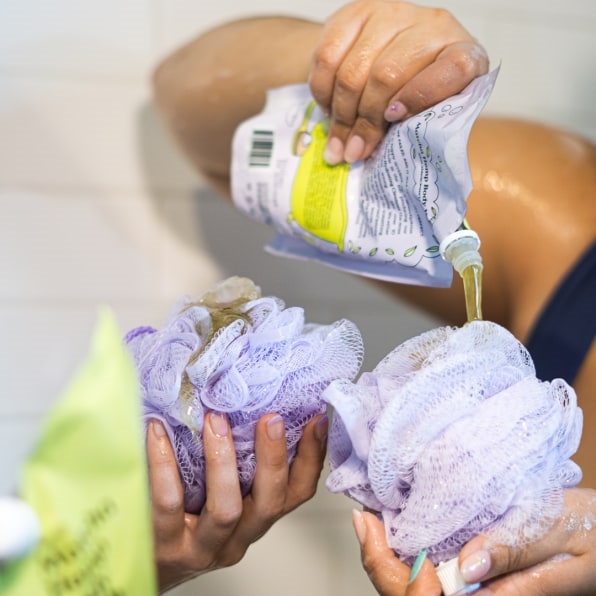
The body wash, which is being sold at cost for $8 a package, is part of KraveBeauty’s “Waste Me Not” campaign, an effort to highlight the often-hidden waste in the beauty industry—that is, waste besides the plastic packaging that customers see. It’s also one example of how the company reused products that otherwise would have been discarded; KraveBeauty is also selling versions of a new cleanser, which was made in pilot batches, with both products only available until the excess stock sells out.
Earlier this year, a production issue resulted in a less-than-stellar batch of KraveBeauty’s best-selling Matcha Hemp Cleanser, giving it a different consistency than customers would be used to. The skin care company was left with more than 1,200 gallons of product that it couldn’t sell in its current form.
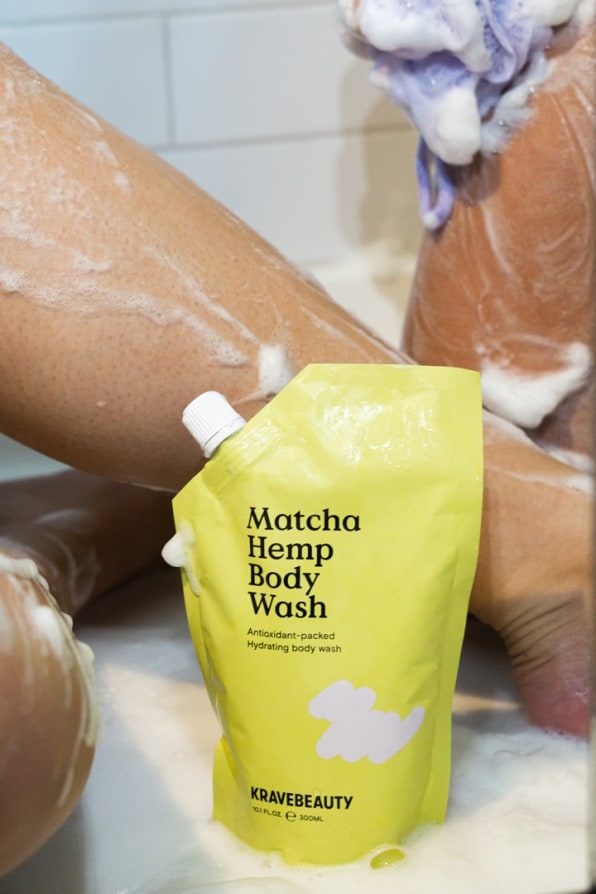
The manufacturer wanted to trash it all and start over, but the company wanted to try to salvage it. After attempting to reformulate the cleanser to bring it up to its standards, KraveBeauty eventually pivoted, adding surfactants and repurposing the excess product into a body wash instead.
As consumers, Yoo says, we often only see the tangible waste of beauty products: the packaging we hold, throw out, or attempt to recycle. But with the wider retail conversation focusing more on “conscious consumption” and attempts to reduce waste rather than just reuse or recycle it, she says there’s room for companies to lead that conversation, “really being intentional and sustainable from the product-development process.”
Waste in the beauty industry comes not just from the box or jar a product is in, but from the testing process to make a new formula, pilot batches, returns, or excess product that can expire while sitting in warehouses or on store shelves. “These are the things customers don’t really have knowledge or awareness of,” says Yoo, “and we wanted to peel back the curtain of the industry to customers and say, packaging is definitely a wasteful thing, but there’s so much more to the conversation.”
It’s hard to measure how much this waste totals for the cosmetic industry, she adds, because companies don’t often quantify the waste that comes from testing or pilot batches. When KraveBeauty looked closely, it calculated that it had created more than $1.5 million in retail value (not cost of goods) of product waste in the past year. That includes those hundreds of gallons of face cleanser, the pilot batches of the new cleanser, and old packaging the company still had after a redesign.
With beauty products especially, consistency is key: customers expect the product to be exactly the same every time they purchase it. But in the manufacturing process, things can go wrong for all sorts of reasons. With KraveBeauty’s Makeup Re-Wined cleanser, a new product meant to have a “jelly” texture, the company had issues when it scaled up production.
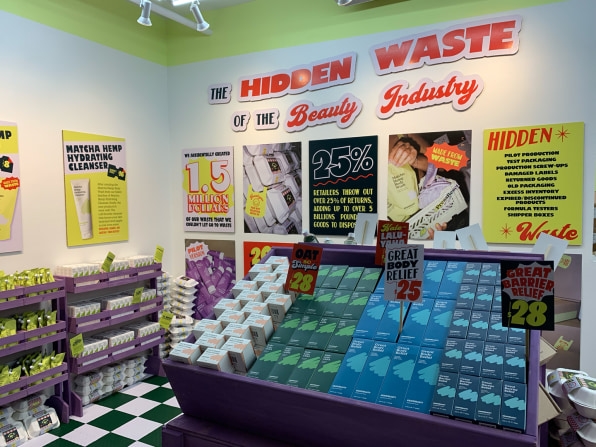
“Because we had gone through so many different pilot productions, that meant that we created so much of this waste—perfectly useable product, just not the consistency that we approved or that we were proud to launch with,” Yoo says. Through the Waste Me Not campaign, KraveBeauty is selling both the new, correct batches of the cleanser as well as the pilot batches, which are 50% off the regular retail price. Yoo says it’s meant to highlight how innovation—whether in cosmetics or other industries like food—often comes with lots of trial and error that get sent to landfills. Though she hopes not to run into production issues again, Yoo says the Waste Me Not initiative will have a pretty permanent place at her company.
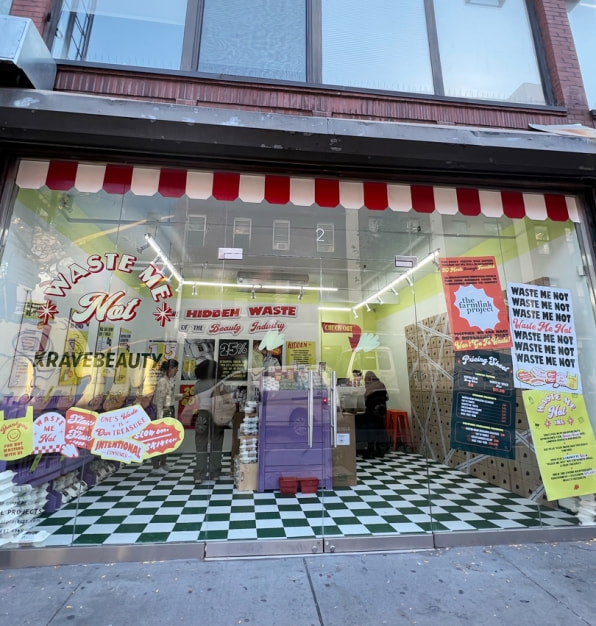
Repackaging this waste may require some additional customer education. KraveBeauty hosted its first retail pop-up in Manhattan, where it sold the Waste Me Not products as well as other products in old packaging at a discount. Yoo says the fact that her company’s brand isn’t “prestigious” allowed this approach to be possible; more luxurious or well-known brands may not take such a route. If there’s unsold inventory from a luxury fashion brand, for example, it’s often intentionally destroyed rather than sold at a discount.
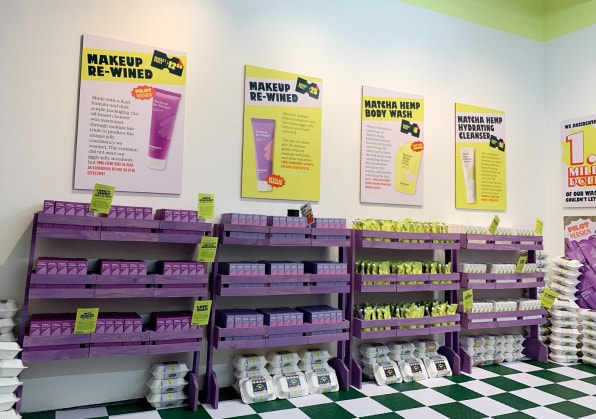
Yoo also made a YouTube video in which she spoke about the company’s mistakes and how it repurposed them as well as about the idea of “hidden waste” overall, not only in beauty but also in fashion, food, and other industries. Sarah Paiji Yoo, cofounder and CEO of cleaning company Blueland, and Melanie Bender, CEO of Rhode Skin, make appearances, talking about their own experiences with production issues and waste. (Blueland, for example, had a “misfits” sale for cleaning tablets that, due to a production error, didn’t quite fit into its reusable spray bottles.)
“This is not a unique issue to KraveBeauty,” Yoo says. “It’s a very common industry-wide issue that we all need to solve together.”
(30)


